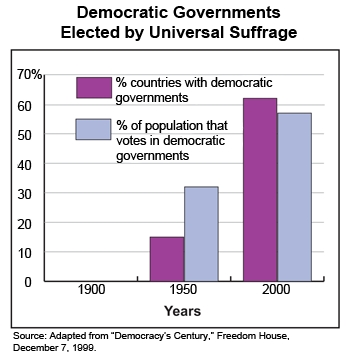-- Exhibit --
The responsibilities of a citizen who lives in a democracy are similar in some ways to those of a citizen in a totalitarian state. For example, a citizen under either system is expected to pay taxes and vote.
However, there are important differences between the two systems. In a democracy, a citizen is expected to respect the rights and opinions of others. The state encourages citizens to become involved in community groups and allows political protest. In a democracy, a citizen has more rights and freedom to carry out his duties. The state exists for the good of the citizen.
In a totalitarian society, the state controls every aspect of human life, and the citizen exists for the good of the state. The primary responsibility of the citizen is to obey and follow. The citizen can vote for only government-approved candidates. The ruling party members or people who support them fill all offices and law-making bodies. Some criticism of the state may be allowed. However, any citizen activity that could interfere with the state, such as a protest march, is outlawed in a totalitarian state
Adapted from Raymond Yuen, publisher, The Way to U.S. Citizenship (Carlsbad, Calif.:
Dominie Press, Inc., 1997), 116; World Book Encyclopedia, Volume 19 (Chicago: World Book, Inc., 2001), 344.
-- Exhibit --


Suppose you were setting up a neighborhood council based on democratic principles.
Which action does the information and the graph encourage you to do to have a successful council?
- the number of members who can vote on council issues
- the budget of the council
- the number of the executive meetings of the council
- the power of the council chairperson's vote
- the number of guest speakers to the council meetings